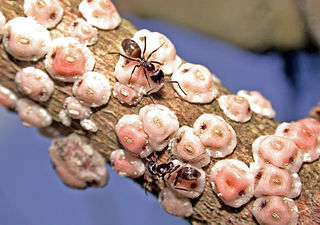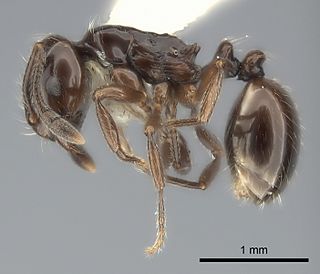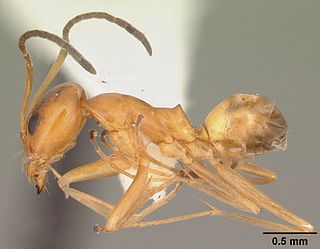Related Research Articles

Dorymyrmex is a genus of ants in the subfamily Dolichoderinae.

Monomorium bidentatum is a species of ant in the subfamily Myrmicinae. It is endemic to two South American countries, Chile and Argentina.

Dorymyrmex insanus is a species of pyramid ant, one of several species known as crazy ants, for their "frenetic" movement and swarming behavior. It is found in hot, dry habitats in the southern parts of the United States, much of Central America, and tropical South America. Dorymyrmex insanus is listed as Vulnerable by the International Union for Conservation of Nature (IUCN).
Dorymyrmex agallardoi is a species of ant in the genus Dorymyrmex. Described by Snelling in 1975, the species is endemic to Chile.
Dorymyrmex antarcticus is a species of ant in the genus Dorymyrmex. Described by Forel in 1904, the species is endemic to Argentina and Chile.
Dorymyrmex antillana is a species of ant in the genus Dorymyrmex. Described by Snelling in 2005, the species is endemic to Puerto Rico and the Dominican Republic, where they nest in open sandy areas.

Dorymyrmex bureni also known as pyramid ant is a species of ant in the genus Dorymyrmex. Described by Trager in 1988, the species is endemic to the United States and Mexico. Pyramid ants are medium-sized ants, ranging from 2–4 mm. They are light orange in color and fast moving. Unlike other ants in the area like red imported fire ants, this species is not aggressive towards humans. The workers have a foul smelling coconut odor when crushed. Dorymyrmex bureni hunt living insects, even other winged ants. They also search for sap-sucking insects from which they collect honeydew. On the head of these ants are curved hairs, used for transporting beads of damp sand. Colonies are small. Nests usually have a single entrance with a mound of sand shaped like a crater. Dorymyrmex bureni prefer sandy soil. This species of ant is not an indoor pest, and pesticides should not be used. They are found throughout Florida.
Dorymyrmex chilensis is a species of ant in the genus Dorymyrmex. Described by Forel in 1911, the species is endemic to Chile.

Dorymyrmex flavopectus is a species of ant in the genus Dorymyrmex. Described by Smith in 1944, the species is endemic to the United States and Mexico.
Dorymyrmex goetschi is a species of ant in the genus Dorymyrmex. Described by Goetsch in 1933, the species is endemic to Chile.
Dorymyrmex hunti is a species of ant in the genus Dorymyrmex. Described by Snelling in 1975, the species is endemic to Chile.
Dorymyrmex hypocritus is a species of ant in the genus Dorymyrmex. Described by Snelling in 1975, the species is endemic to Chile.
Dorymyrmex incomptus is a species of ant in the genus Dorymyrmex. Described by Snelling in 1975, the species is endemic to Chile.

Dorymyrmex lipan is a species of ant in the genus Dorymyrmex. Described by Snelling in 1995, the species is endemic to the United States and Mexico.
Dorymyrmex minutus is a species of ant in the genus Dorymyrmex. Described by Emery in 1895, the species is endemic to Argentina and Chile

Dorymyrmex paiute is a species of ant in the genus Dorymyrmex. Described by Snelling in 1995, the species is endemic to the United States.
Dorymyrmex planidens is a species of ant in the genus Dorymyrmex. Described by Gustav Mayr in 1868, the species is endemic to Argentina and Chile.

Dorymyrmex pogonius is a species of ant in the genus Dorymyrmex. Described by Snelling in 1975, the species is endemic to Chile.
Dorymyrmex tener is a species of ant in the genus Dorymyrmex. Described by Gustav Mayr in 1868, the species is endemic to Argentina and Chile.
Dorymyrmex xerophylus is a species of ant in the genus Dorymyrmex. Described by Cuezzo and Guerrero in 2011, the species is endemic to Colombia.
References
- ↑ Snelling, R. R. 1975. Descriptions of new Chilean ant taxa (Hymenoptera: Formicidae). Contr. Sci. (Los Angel.)274: 1-19 (page 14, figs. 20, 21 worker described)